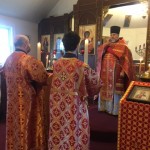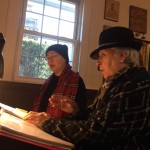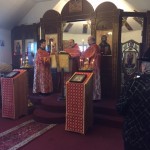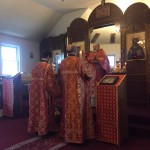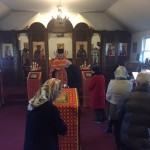On Sunday, December 23, on the 29th Sunday after Pentecost, the Rector of St. George Church, Archpriest Igor Tarasov served the Divine Liturgy at our parish temple. After the reading from the Holy Gospel he preached a homily in Russian. An English translation of that homily is as follows:
“Today’s Sunday Gospel reminds us again about the need to be grateful.”
“Jesus entered a village and was met by ten lepers who lifted up their voices and said, “Jesus, Master, have mercy on us!” (Lk. 17, 13). Leprosy was, and as you know it still exists, leprosy is one of the most wretched and hopeless diseases. It is a daily dying. And the specialists say, it has almost no symptoms. A leper does not feel pain but his body is decaying while he is still alive. So those ten miserable lepers came to Jesus having faith and hope that he can help them. And He did. He said, “Go, show themselves to the priests” (Lk. 17, 14). That was a prescription of the Jewish law that the priests examined persons who claimed they became healed from leprosy and could give them a certificate that they are really cleansed. Sending the lepers to the priests, Jesus wished that they demonstrate their faith. They were still sick when they had to go, so Christ wanted them to believe Him. And they were probably confused first. Yet they went.”
“On their way to the priests all of them cleansed. We can imagine the great joy they must have felt when they realized that they had been healed. One would think they would rush back to thank Jesus for delivering them from this dreadful disease. But this is the awful part of the story: only one of them came back to give thanks. All except one forgot to show gratitude. All went to Christ for healing, yet only one came back to praise Him. How typical of man!”
“We are very quick to pray in trouble and very slow to pray when everything seems to be fine. A story is told of a chaplain in World War 1 whose duty was to censor the letters of the soldiers. The night before the battle many of them wrote letters full of fear and promises that if they survive, they will become better, will pray and go to church, will try to avoid sins. Some even pledged to become priests or monks. But after the battle the tone of the letters changed completely. They were writing not their moms but their friends asking whether they could get together during a leave and have good time. Before the battle: “Oh, God, help me get through tomorrow!” After the battle: “Well, I got through, God, so I don’t need you any more”.”
“So the Lord asked, “Were there not ten cleansed? But where are the nine?” (Lk. 17, 17). In fact, were not many but the whole human kind was delivered from the tyranny of sin by our Lord when He came into this world. He dame, He was born in Bethlehem to save us [….]. All of us. We all received His grace, His gift of liberty, His power of victory. All good things in our life are because of Him.”
“But do we praise Him? Sometimes we do. All our Orthodox Liturgy is about praise and thanksgiving. We begin our Church services exclaiming “Blessed be our God…” Then we keep saying “Glory to Thee…” Even the very name of our major Sacrament is the Eucharist which is from Greek Eucaristia, translated as “Thanksgiving”. Thus our Divine Liturgy is in fact, service of thanksgiving. Often we don’t realize that. We know that it is the most important service in the Church. There other services: Vespers, Compline, Midnight service, Matins, Hours, and they are served in the monasteries. In many parishes Vespers and Matins are served. Most of the church-going people usually attend the Liturgy and should know that at the Liturgy we have a sacrifice, an offering of the bread and wine which becomes the true Body and Blood of Christ. The Holy Spirit is being invoked by the priest and the He descends and changes the bread and wine into the Body and Blood of the Lord. Faithful receive Holy Communion. It is really difficult to realize that it is thanksgiving. But it is because in our prayers of the Liturgy we give thanks to the Lord. The priest even exclaims: “Let us give thanks to the Lord!” Most of the priestly secret prayers are about giving thanks for everything: for salvation, for redemption of the human race, for a possibility to offer this sacrifice, for the promise of eternal life, even for the opportunity to do the remembrance of Him who offered His life for us.”
“So, sometimes we do thank God. But how many times we fail to praise Him or to be grateful! And again the Lord may ask, “Were not ten cleansed? Where are the nine?” Let them return as did the one. They have every reason to praise God with loud voice and give Him thanks. And let us, dear brothers and sisters, not fail to be grateful to our Lord and Savior Jesus Christ in order to be worthy of His immeasurable graces.”
The choir prayerfully performed hymns to the commemorated Saints before Holy Communion.
After the dismissal of the Liturgy the Rector preached a brief sermon addressing the thoughts of his Russian homily.
Following the service in the church the Rector and the Warden Olga Roussanow visited our long-time parishioner Vera Koretz in the hospital. Lately she became very ill and had been hospitalized. Fr. Igor performed the Mystery of the Holy Unction over the infirm.

